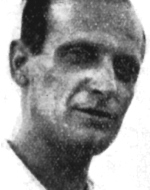Hershkop, Alexander (Sando)
Son of Berta and Dov-Berko, was born on June 10, 1914, in the city of Braila, Romania. His parents’ home lacked the spirit of Jewish tradition and he was educated in a Romanian high school. He himself found the way to the Hanoar Hazioni Movement and the training farm. He had a large part in organizing Aliyah Bet, which passed through Romania in 1939, and in the same year he also emigrated. In Israel he worked as a farmer, but also held public positions: as bookkeeper and as a representative of his group, Nitzanim, before the institutions. From 1946 to 1947 he was the emissary of institutions in Europe and a member of the executive committee of the Haoved Hazioni movement. As an apprentice to the Tzofit movement, he excelled in his loyalty, his punctuality and his sense of responsibility. He aspired to improve the relations of society and stood the test of the various crises that took place within it. In recent days, he was offered arms and reinforcements and was given the chance to be with his family after he had a daughter. He rejected the proposal in his honor to remain in the defense of the place. After the progress of the Egyptian column near Ashdod was halted, Kibbutz Nitzanim remained behind. The Egyptians understood that this point could serve as a basis for the activity of our forces in the rear and therefore concentrated considerable force in order to conquer it. The Egyptian attack was launched on June 7, 1948. In the early hours of the night, the agriculture was severely shelled, and in the morning the infantry assault began, but this was stopped by the defenders. The Egyptians increased the shelling and even activated planes that bombed the agriculture and caused heavy damage. Under this cover, Egyptian infantry and armored forces advanced and managed to penetrate the agriculture and take control of it. In this battle he fell on the 29th of Iyar 5708 (June 7, 1948) when he was hit by an anti-tank shell that penetrated his position and was brought to rest in the Nitzanim cemetery.
